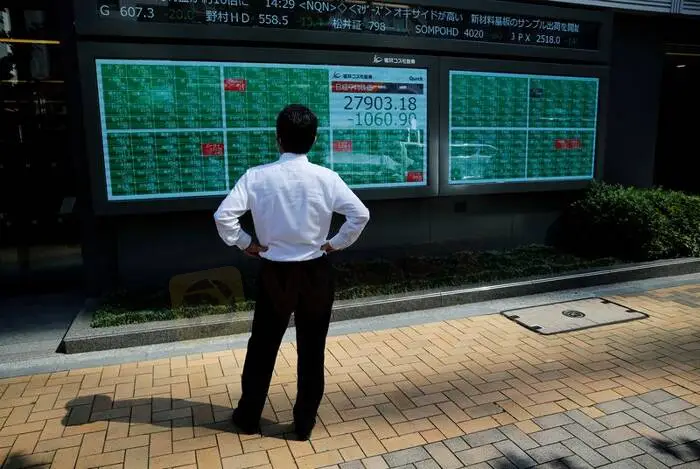简体中文
繁體中文
English
Pусский
日本語
ภาษาไทย
Tiếng Việt
Bahasa Indonesia
Español
हिन्दी
Filippiiniläinen
Français
Deutsch
Português
Türkçe
한국어
العربية
Shares shrivel after Powell’s renomination; Turkish lira crashes
Abstract:Asia stocks were mostly lower on Tuesday, tracking a retreat on Wall Street after President Joe Biden picked Federal Reserve Chair Jerome Powell to lead the central bank for a second term, reinforcing expectations the U.S. will taper its stimulus soon.
Stock markets fell sharply and the dollar held on to recent gains on Tuesday as investors positioned for interest rate hikes in 2022 after Federal Reserve Chairman Jerome Powell was nominated for a second term.
After Wall Street turned lower on Monday, Asian shares dropped and European stocks opened in the red. Futures on Wall Street also pointed to a second day of losses in the United States.
The EURO STOXX 50 dropped 1.4%, while Britain‘s FTSE 100 shed 0.5% and Germany’s DAX 1.38%.
MSCI‘s gauge of Asia Pacific stocks outside Japan fell 0.43%, while Hong Kong’s Hang Seng Index slid 1%.
The most dramatic moves were again in the Turkish lira, which lost 8% of its value, crashing to a new record low below 12 lira per dollar as investors panicked about the prospect of more interest rate cuts when they say the opposite is needed to curb rising inflation.
U.S. President Joe Biden on Monday tapped Powell to continue as Fed chair, and Lael Brainard, the other top candidate for the job, as vice chair. The news initially buoyed Wall Street stocks, before the market pulled back into the afternoon with the S&P 500 and Nasdaq Composite closing down from all-time highs.
The sense that a second term under Powell could add to policymakers desire to curb rising inflationary forces also sent investors buying dollars.
The greenback, measured against a basket of currencies, rose to a new 16-month high and pushed the euro further below $1.13 to $1.1226, the weakest level for the single currency since July 2020. By 0900 GMT the euro had come off those lows.
“On the one hand, U.S. President Joe Bidens decision to confirm Jerome Powell as Fed chair is generally seen as more positive for the greenback as Mr. Powell is considered less dovish than Lael Brainard,” said UniCredit strategists. “On the other hand, the fact that current COVID-19 developments are primarily affecting the eurozone represent another drag on the common currency.”
U.S. Treasury yields were led higher by two-year notes, which typically move in step with interest rate expectations. Those yields hit their highest level since early March 2020 and were last trading at 0.638%.
“The market is expecting higher probabilities of rate hike next year,” said Edison Pun, Senior Market Analyst at Saxo Markets, pointing to expectations as high as for three or four rate rises next year.
Adding to the gloomy mood were new concerns about COVID-19 cases. Riskier assets have been shaken in recent sessions by surging COVID-19 cases in Europe and renewed curbs, dousing investor hopes of a quicker recovery in consumption and growth worldwide.
Germanys outgoing Chancellor Angela Merkel said the latest surge is the worst experienced by the country so far, while Austria went into a fresh lockdown on Monday.
Euro zone purchasing managers index numbers for November showed business growth unexpectedly accelerating but that failed to lift sentiment.
In commodities, spot gold dropped 0.19% to $1,801 an ounce. Gold prices were under pressure as Powells nomination drove expectations that the central bank will stay the course on tapering economic support.
Oil prices were in the red again after a short rebound the previous day from recent losses on reports that OPEC+ could adjust plans to raise oil production if large consuming countries release crude from their reserves or if the coronavirus pandemic dampens demand.
Brent crude weakened 1.28% at $78.70 a barrel and U.S. crude dropped 1.63% to $75.48 per barrel.
The U.S. Department of Energy is expected to announce a loan of oil from the Strategic Petroleum Reserve on Tuesday in coordination with other countries, Reuters reported earlier.
(Additional reporting by Kane Wu in Hong Kong; Editing by Raissa Kasolowsky)

Disclaimer:
The views in this article only represent the author's personal views, and do not constitute investment advice on this platform. This platform does not guarantee the accuracy, completeness and timeliness of the information in the article, and will not be liable for any loss caused by the use of or reliance on the information in the article.
WikiFX Broker
Latest News
Think Before You Click: Malaysian Loses RM240,000 to Investment Scam
Lawsuit Filed Against PayPal Over Honey’s Affiliate Fraud
What Are The Top 5 Cryptocurrency Predictions For 2025?
XRP Price Prediction for 2025: Will It Hit $4.30 or More?
Dr. Sandip Ghosh, Ex-RG Kar Principal, Involved in Multi-Crore Scam
OPEC's Profound Influence on the Oil Market
Just2Trade: SAFE or SCAM?
The January Effect of 2025 in Forex Markets
New York becomes first US city with congestion charge
Currency Calculator






